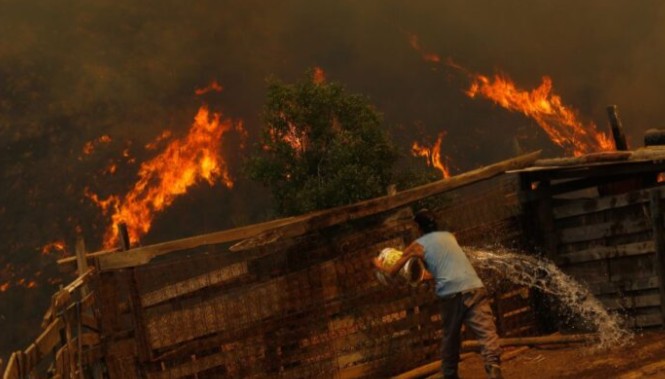The Office of the Comptroller General of the Republic (CGR) identified major shortcomings in the strategy and management of the National Disaster Prevention and Response Service (Senapred) for addressing wildfires. Certain municipalities were also criticized for lacking emergency plans.
Specifically, the oversight body examined what is known as the "Strategy for Strengthening Wildfire Management 2023-2024."
In the document, the Comptroller's Office warns that the strategy’s formulation did not consider "a prior data collection process that would allow defining the resources, functions, and competencies of the participating institutions."
This applies "both at the national and regional levels to fulfill assigned tasks. The purpose was to identify in advance any factors that could affect its implementation and execution, as well as the achievement of desired impacts."
At the same time, "it was noted that the activities, parameters, delivery methods for outputs, and feedback stages, among others, were not defined. These would have allowed Senapred, as the body responsible for monitoring compliance with the Strategy by involved entities, to carry out this task."
Additionally, deficiencies were found in the accreditation of outputs that, although they should have been executed by other divisions, their compliance was the responsibility of the aforementioned service.
"Indeed, critical bottlenecks were identified in all 13 regions participating in the Strategy, including a lack of human and financial resources, as well as the capacity of involved organizations to deliver the assigned outputs," states the CGR.
Adding, "Senapred itself was one of the entities that, due to technical and resource difficulties, failed to fulfill certain commitments, along with the National Forestry Corporation (Conaf) and Chile’s Fire Department, which argued these tasks were not their responsibility."
Municipal Management of Wildfires
The same report notes that "of the 326 municipalities required to submit information, located between the Atacama and Magallanes and Chilean Antarctic regions, only 97 provided Senapred with details on the Disaster Risk Management Committees (Cogrid) held, while the remaining 229 did not prove their completion."
According to the Comptroller’s Office, "the lack of information on the execution of municipal Cogrids makes it impossible to verify whether they took place. This indicates that Senapred, as the entity responsible for implementing this output, did not require these municipalities to report on the organization of working sessions."
"Moreover, if these working sessions were not held, there is a risk that local authorities and citizens remain unaware of emergency response protocols," it adds.
On the other hand, "the aforementioned Law No. 21.364 establishes the National Disaster Prevention and Response System and, specifically, Articles 28 and 32 mandate municipalities to develop or update the Communal Disaster Risk Reduction Plan (PRRD)."
"And the Communal Emergency Plan (PCE), in both cases, requires prior technical input from Senapred and approval from the Communal Committee referred to in Article 8 of this legal framework," it states.
Source:BiobioChile







Comments (0)
No comments yet. Be the first to comment!
Leave a comment